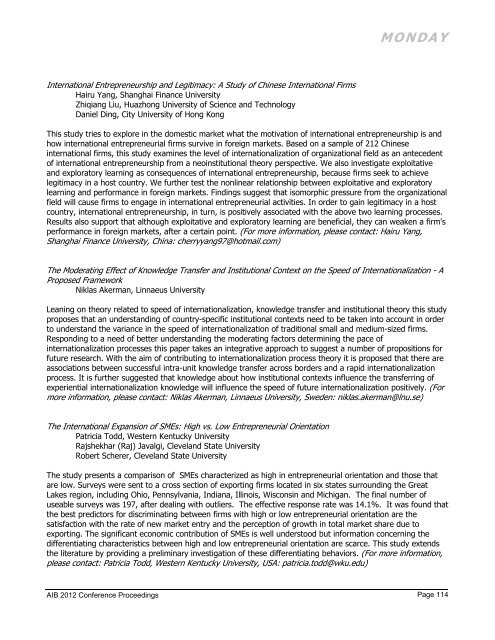AIB 2012 Conference Proceedings - Academy of International ...
AIB 2012 Conference Proceedings - Academy of International ...
AIB 2012 Conference Proceedings - Academy of International ...
You also want an ePaper? Increase the reach of your titles
YUMPU automatically turns print PDFs into web optimized ePapers that Google loves.
MONDAY<br />
<strong>International</strong> Entrepreneurship and Legitimacy: A Study <strong>of</strong> Chinese <strong>International</strong> Firms<br />
Hairu Yang, Shanghai Finance University<br />
Zhiqiang Liu, Huazhong University <strong>of</strong> Science and Technology<br />
Daniel Ding, City University <strong>of</strong> Hong Kong<br />
This study tries to explore in the domestic market what the motivation <strong>of</strong> international entrepreneurship is and<br />
how international entrepreneurial firms survive in foreign markets. Based on a sample <strong>of</strong> 212 Chinese<br />
international firms, this study examines the level <strong>of</strong> internationalization <strong>of</strong> organizational field as an antecedent<br />
<strong>of</strong> international entrepreneurship from a neoinstitutional theory perspective. We also investigate exploitative<br />
and exploratory learning as consequences <strong>of</strong> international entrepreneurship, because firms seek to achieve<br />
legitimacy in a host country. We further test the nonlinear relationship between exploitative and exploratory<br />
learning and performance in foreign markets. Findings suggest that isomorphic pressure from the organizational<br />
field will cause firms to engage in international entrepreneurial activities. In order to gain legitimacy in a host<br />
country, international entrepreneurship, in turn, is positively associated with the above two learning processes.<br />
Results also support that although exploitative and exploratory learning are beneficial, they can weaken a firm's<br />
performance in foreign markets, after a certain point. (For more information, please contact: Hairu Yang,<br />
Shanghai Finance University, China: cherryyang97@hotmail.com)<br />
The Moderating Effect <strong>of</strong> Knowledge Transfer and Institutional Context on the Speed <strong>of</strong> <strong>International</strong>ization - A<br />
Proposed Framework<br />
Niklas Akerman, Linnaeus University<br />
Leaning on theory related to speed <strong>of</strong> internationalization, knowledge transfer and institutional theory this study<br />
proposes that an understanding <strong>of</strong> country-specific institutional contexts need to be taken into account in order<br />
to understand the variance in the speed <strong>of</strong> internationalization <strong>of</strong> traditional small and medium-sized firms.<br />
Responding to a need <strong>of</strong> better understanding the moderating factors determining the pace <strong>of</strong><br />
internationalization processes this paper takes an integrative approach to suggest a number <strong>of</strong> propositions for<br />
future research. With the aim <strong>of</strong> contributing to internationalization process theory it is proposed that there are<br />
associations between successful intra-unit knowledge transfer across borders and a rapid internationalization<br />
process. It is further suggested that knowledge about how institutional contexts influence the transferring <strong>of</strong><br />
experiential internationalization knowledge will influence the speed <strong>of</strong> future internationalization positively. (For<br />
more information, please contact: Niklas Akerman, Linnaeus University, Sweden: niklas.akerman@lnu.se)<br />
The <strong>International</strong> Expansion <strong>of</strong> SMEs: High vs. Low Entrepreneurial Orientation<br />
Patricia Todd, Western Kentucky University<br />
Rajshekhar (Raj) Javalgi, Cleveland State University<br />
Robert Scherer, Cleveland State University<br />
The study presents a comparison <strong>of</strong> SMEs characterized as high in entrepreneurial orientation and those that<br />
are low. Surveys were sent to a cross section <strong>of</strong> exporting firms located in six states surrounding the Great<br />
Lakes region, including Ohio, Pennsylvania, Indiana, Illinois, Wisconsin and Michigan. The final number <strong>of</strong><br />
useable surveys was 197, after dealing with outliers. The effective response rate was 14.1%. It was found that<br />
the best predictors for discriminating between firms with high or low entrepreneurial orientation are the<br />
satisfaction with the rate <strong>of</strong> new market entry and the perception <strong>of</strong> growth in total market share due to<br />
exporting. The significant economic contribution <strong>of</strong> SMEs is well understood but information concerning the<br />
differentiating characteristics between high and low entrepreneurial orientation are scarce. This study extends<br />
the literature by providing a preliminary investigation <strong>of</strong> these differentiating behaviors. (For more information,<br />
please contact: Patricia Todd, Western Kentucky University, USA: patricia.todd@wku.edu)<br />
<strong>AIB</strong> <strong>2012</strong> <strong>Conference</strong> <strong>Proceedings</strong><br />
Page 114

















